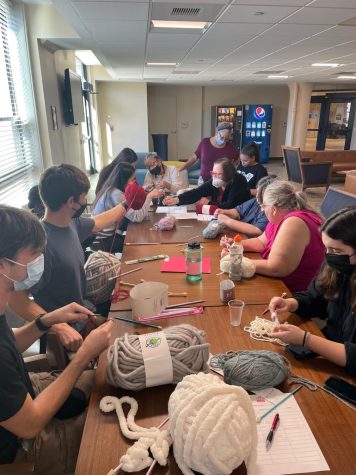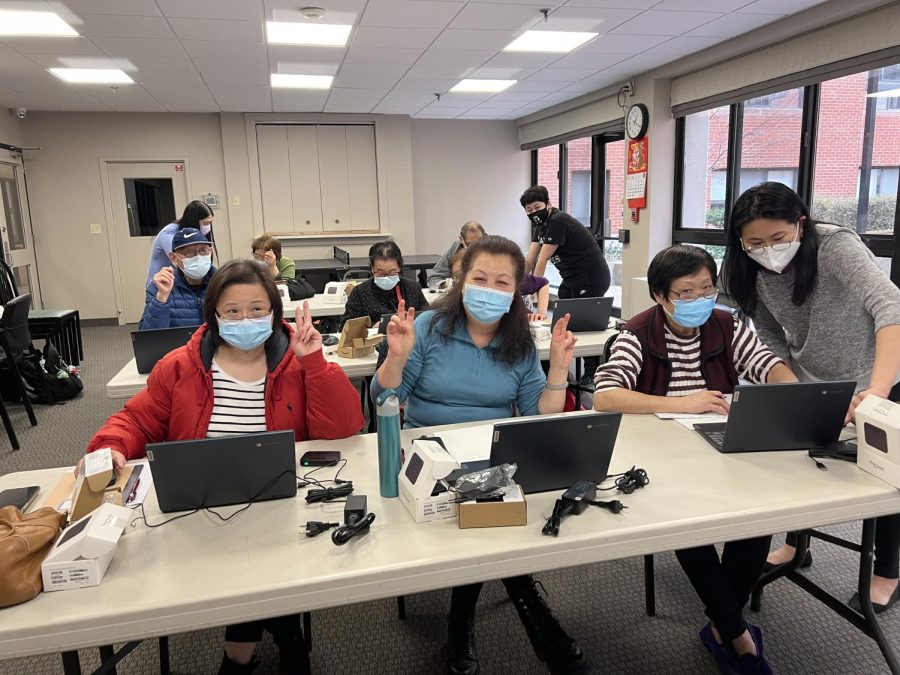LBFE Boston connects college students with older adults to combat elder isolation
Members of LBFE set up new laptops with the help of their college-aged friends. The organization’s Digital Dividends program has provided members with their own Chromebooks, hotspots with unlimited data plans and personalized assistance with using this technology. Photo courtesy LBFE.
March 22, 2023
Little Brothers Friends of the Elderly, or LBFE, is working to break down social barriers and integrate older adults into their communities. Working with students at local universities, the organization offers a variety of programs at affordable housing sites around Boston and provides a safe space for attendees to form connections that span generations.
Boston’s LBFE chapter was established in 1979, and the organization now has three main programs that run from the North End to Brighton and Hyde Park. Nikki Shults, the executive director of LBFE, said the organization aims to include a diverse range of participants.
“One of the things we are very proud of is that we work with a lot of non-native English speaking older adults,” Shults said. “We have programs in eight different languages, and that is pretty unique to our organization and social services in general. We are really proud that we have been able to bring people of different cultures together.”
Shults began working for LBFE as a volunteer coordinator in 2013 and became the executive director in 2015.
“Growing up, my grandmother was kind of like my best friend,” Shults said. “Ever since I was younger, I knew I wanted to work with older people. So I got a degree in healthcare management and was a social worker. When I was job searching, I stumbled across LBFE. It really felt like my career had led up to this point — it felt like coming home.”
The organization engages older adults in a number of ways. Its social program, Intergenerational CitySites, focuses on forming friendships across generations, with weekly activities, such as card games, arts and crafts, and language exchanges.
“We set up these activities to make it easier to build connections,” Shults said. “As a 19-year-old, it can be difficult to see what you have in common with a 90-year-old.”
LBFE’s other programs provide older adults with access to services that may not be available in affordable housing. The Creative Connections program offers eight weeks of fine arts courses taught by professional instructors, including painting and dancing. The Digital Dividends program focuses on tech equity, giving each person their own Chromebooks, a hotspot with an unlimited data plan and personalized instruction on a number of technology topics.

Shults said these courses are intended to mimic programs in market-rate housing for older adults.
“Without these opportunities and programs, it can be difficult to engage with your neighbors and build a safety net,” Shults said. “You can think about it like your freshman year of college. Imagine moving in without any programs or mixers to help you meet other students. In a lot of the buildings that we work with, they have really great coordinators but they are often spread too thin and don’t have the resources to provide these kinds of opportunities.”
One of the program sites for Digital Dividends is located at the Mission Main apartment complex in Mission Hill. Here, a small but dedicated group meets weekly to build their technology skills. This group is led by Program Manager Teresa Yao and Annie Lin, a Northeastern second-year on her first co-op as a program assistant for LBFE.
Lin, an international affairs and international business combined major, said she wanted to gain experience in the nonprofit sector at her co-op. She explained that at each Digital Dividends meeting, attendees can come in with specific technology questions to discuss, or the group might focus on a broader prepared lesson.
“We have to come in being super flexible and open-minded,” Lin said. “In this class, since it’s more one-on-one, we have more flexibility to teach them what they want to learn compared to a bigger structured course where people are all learning at different paces.”
Ernestine Washington, one of the program’s attendees and a resident of Mission Main, said the class provides her with knowledge to build off what she already knows.
“I’m a little familiar with computers, but I am a lifelong learner, and as you get older, your memory drifts away,” Washington said. “The details in the tech world are always changing.”
Another attendee and resident, Dorothy Spencer, said her goal is to become self-sufficient when using technology.
“I’m not good at [using the computer] at all, and my memory fails me,” Spencer said. “When I go home I forget my skills and I get stuck, and I’m scared I will break the computer. So, I’m glad for everyone helping me. I just want to accomplish my mission of opening my computer and getting where I need to go.”
After Spencer’s remark, Yao replied with encouragement.
“You’re better than you give yourself credit for,” Yao said. “It’s just about having confidence.”
Throughout the one-hour session, the older adults work with Yao and Lin to address specific topics. While Washington is clearing out her email inbox and learning how to unsubscribe from mailing lists, Spencer is booking flights to Chicago for a family reunion. Both bend over their sticker-covered Chromebooks while the volunteers look on, providing support as needed.
In addition to enrichment programs like Digital Dividends, LBFE focuses on developing relationships between young adults and their older counterparts. When they aren’t discussing technology, the attendees chat about their families and pets, and details they remember from previous sessions together.
Lin explains that the volunteers stay away from words like “elderly” or “senior” to address the older adults in order to avoid ageism. In response, Washington said she appreciated hearing that the young adults were keeping their language in mind.
“Ageism is a huge problem in this country,” Washington said. “When you pass 65 years old, you feel more invisible. It’s like you’re ‘put out to pasture,’ and like your thoughts and experiences don’t count as much. But I think young people are starting to understand that experience means a lot.”
Volunteering is open to all students, despite the organization’s gendered name, which dates back to its origins in 1940s Paris. The founder of LBFE was a man named Armand Marquiset, who wanted to give back to the community in honor of his grandmother. In the aftermath of World War II, he saw how many of Paris’s older adults were impoverished and isolated. He and his friends formed the Little Brothers, visiting poor neighborhoods around the city to provide material support and friendship.
Today, the organization has chapters across Europe and the United States, and welcomes anyone who is supportive of its mission.
LBFE hires Northeastern co-ops as program assistants for each six-month cycle, and other students can get involved by participating in service learning courses or by getting in touch with the organization.
“Over the summer I stayed [on campus], and I just emailed the managers and got involved that way,” Lin said. “The best way to get started is to reach out. To be a volunteer, all you need is to be open-minded and flexible.”







